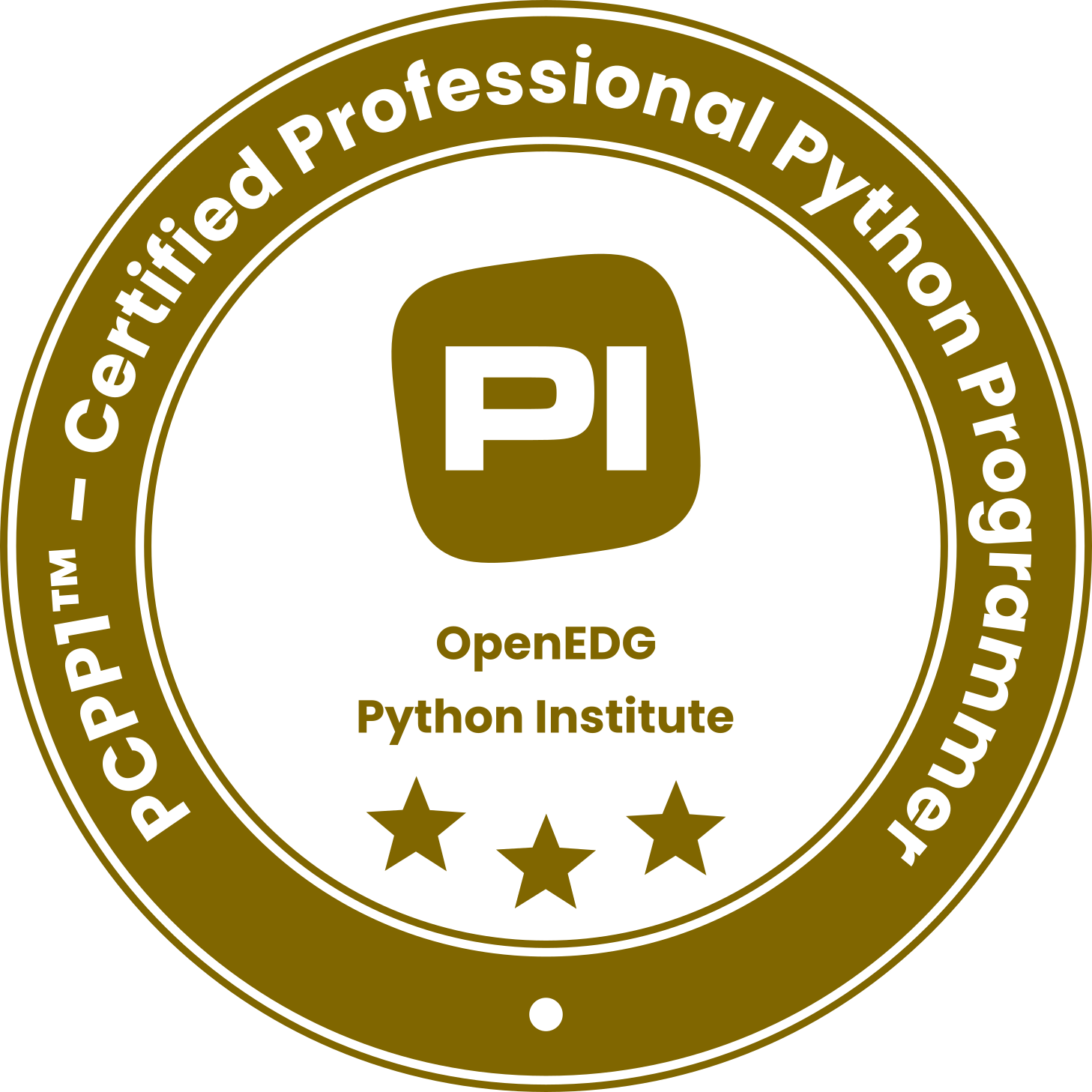PCPP 1

| Formats: | Asynchronous |
| Blended | |
| Online | |
| Onsite | |
| Part-time | |
| Level: | Intermediate |
| Prerequisites: | |
| Recommended Knowledge | |
| Core Python | |
| Certified Associate in Python Programming | |
Formats: We offer our training content in a flexible format to suit your needs. Contact Us if you wish to know if we can accommodate your unique requirements.
Level: We are happy to customize course content to suit your skill level and learning goals. Contact us for a customized learning path.
Certified Professional in Python Programming 1 (PCPP 1)
Our Certified Professional in Python Programming 1 (PCPP-1) training course offers an extensive dive into advanced Python programming, tailored to equip you with the skills necessary for sophisticated programming tasks. This course covers a broad array of topics, including file processing and interacting with a program’s environment, GUI programming, understanding and implementing Python Enhancement Proposals (PEPs), network programming, and advanced object-oriented programming concepts. You'll learn to handle different file types, such as SQLite databases, XML, and CSV, and master modules like os, datetime, io, and time for effective program-environment communication. Additionally, you'll explore GUI creation with tkinter and pygame, dive into coding conventions and principles through PEPs, and gain expertise in network programming with sockets. Advanced object-oriented programming topics like inheritance, polymorphism, metaprogramming, and more will round out your comprehensive Python education.
Target Audience
This course is designed for experienced Python developers who have already achieved the PCAP certification or possess equivalent knowledge and skills. It is ideal for professionals aiming to advance their careers in software development, data science, automation, and other fields requiring advanced Python programming capabilities. The training is particularly beneficial for those preparing for the PCPP-1 certification exam, providing a detailed understanding of all necessary topics. Participants should have a strong foundation in Python and be comfortable with basic object-oriented programming, file handling, and standard Python libraries to fully benefit from this advanced training.
Job Opportunities
Completing the PCPP-1 training opens numerous job opportunities in various high-demand fields. You can pursue roles such as Senior Python Developer, Software Engineer, Data Analyst, Data Engineer, and Automation Engineer. The advanced skills acquired in this course are also highly valuable in cybersecurity, where Python is essential for scripting and automation, as well as in web development, where sophisticated programming techniques are required. This certification validates your expertise and significantly enhances your employability, making you a valuable asset to any organization leveraging Python for its technical solutions.
PCPP-32-1: Certified Professional in Python Programming 1
- File Processing and Communicating with a Program’s Environment
- Processing different kinds of files
- sqlite3 – interacting with SQLite databases
- xml – creating and processing XML files
- csv – CSV file reading and writing
- logging – basics logging facility for Python
- configparser – configuration file parser
- Communicating with a program’s environment:
- os – interacting with the operating system,
- datetime – manipulating with dates and time
- io – working with streams,
- time – time access and conversions
- Processing different kinds of files
- GUI Programming
- What is GUI and where it comes from
- Constructing a GUI – basic blocks and conventions
- Event-driven programming
- Currently used GUI environments and toolkits
- tkinter — Python interface to Tcl/Tk
- tkinter’s application life cycle
- Widgets, windows and events
- Sample applications
- pygame – a simple way of developing multimedia applications
- Python Enhancement Proposals
- What is PEP?
- Coding conventions – not only style and naming
- PEP 20 – The Zen of Python: a collection of principles that influences the design of Python code
- PEP 8 – Style Guide for Python Code: coding conventions for code comprising the standard library in the main Python distribution
- PEP 257 – Docstring Conventions: what is docstring and some semantics as well as conventions associated with them
- A tour of important PEPs
- Python Network Programming
- Python Socket Module
- Introduction to sockets
- Server Socket Methods
- Client socket methods
- General socket methods
- Client-Server vs. Peer-to-peer
- Other Internet nodules
- Python Socket Module
- Advanced Perspective of Classes and Object-Oriented Programming in Python
- Classes, Instances, Attributes, Methods
- Working with class and instance data
- Copying object data using shallow and deep operations
- Inheritance and Polymorphism
- Different faces of Python methods: static and class methods
- Abstract classes vs. method overloading
- Composition vs. Inheritance – two ways to the same destination
- Implementing Core Syntax
- Subclassing built-ins
- Attribute Encapsulation
- Advanced techniques of creating and serving exceptions
- Serialization of Python objects using the pickle module
- Making Python object persistent using the shelve module
- Metaprograming
- Function decorators
- Class decorators
- Metaclasses